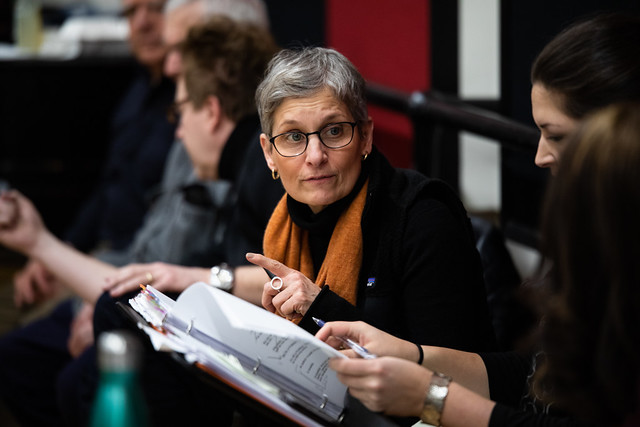We ask MSM Associate Dean and Director of Musical Theatre Liza Gennaro what she thinks makes a strong musical theatre audition, whether virtual or in-person.
Liza Gennaro is a respected choreographer who has worked on many on and off Broadway productions, and has led the MSM Musical Theatre program since 2018. Her acclaimed book Making Broadway Dance was published by Oxford University Press in late 2021.

Liza Gennaro, Associate Dean and Director of Musical Theatre, overseeing rehearsals of Cabaret at MSM
What can a student do to put their best foot forward in a virtual audition?
The most important thing for students — and I think really the hardest thing — is to present their genuine selves. They need to take the time to prepare their materials for themselves. What do they love about the material that they’re working on, and why do they love performing it? They should not feel that they have to present material that they think the adjudicators want to hear.
And in terms of appearance, it’s all up to the students how they want to dress and present themselves, there really isn’t a wrong answer!
What would you say is the biggest difference between an in-person and virtual audition?
With the virtual audition, you’re contending with sound, recording quality, background, lighting, and whether you’re working with live accompaniment or a track. Take a moment before the audition to set up, make sure you like the sound and lighting, and make sure you have a smooth way of getting to your track. It’s perfectly ok to take a moment to turn on the track, it doesn’t need to just magically come on.
In preparing for both an in-person and virtual audition, there will likely be distractions, and everyone has their own way of staying focused, whether that means putting headphones on and listening to music, reading a book, or reviewing your monologue.
Really think through what will put you in that neutral space where you can walk into the room or stand in front of the camera and deliver the material to the best of your ability.
What stands out to you the most in an audition?
What stands out the most is when a person comes into the room with confidence and seems like they’re having a great time when presenting their material. You could be singing a very serious song, or reading a wrenching monologue — we can tell if you’re getting a charge out of doing it, and that’s really what we’re looking for, that commitment and need for the performer to express themselves through that material.
Think about how you can approach every opportunity — whether it be a self-recording or an audition — as a chance to perform. We’re not only looking for talent, we also want to see if a person has drive, commitment, focus, and a level of versatility between vocal stylings.
We want to see students who are tenacious, upbeat, polite — these things all come through, even on a self-record. A lot of people have talent, but what will get you to that next level is making relationships and being someone that people want to work with.
Is there any other advice you’d like to give to students who are auditioning?
You can always bring a bottle of water with you to your audition. If you get a little catch in your throat, it’s perfectly acceptable to stop, take a sip of water, and start again.
Nerves do a lot of crazy things to you, and you are more than permitted to stop and start again if you feel like you began a song in the wrong key or missed lines in your monologue. Don’t be afraid to take a minute and do what you need to do to feel ready. Those of us who are adjudicating these auditions have been in the field for a very long time, and we want to see the auditionee doing their best work.
Additionally, if you’re in a live audition and working with an accompanist, make sure that your music is clearly marked and that you’re giving them the right tempo. The accompanist is your colleague, and you should be clear about what you need from them. Please be nice to them, and appreciate the work and talent they themselves are contributing to your audition.
